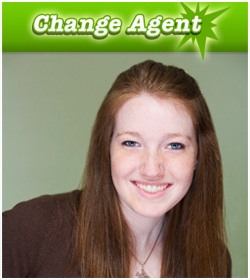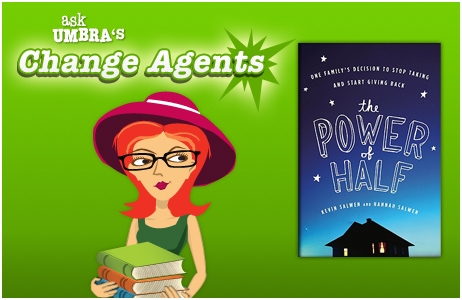What would you do with half? Half the house, half the lattes, half the TV watching, half the Tweets, half the email checking? More importantly, what would you do with the other half — the extra space, funds, and time?
 Dearests, meet 17-year-old Atlanta Girls’ School junior Hannah Salwen (you may have read about her in New York Times columnist Nicholas Kristof’s column last month), whose family not only asked these questions of themselves but also answered them in a pretty grand way. Co-author of The Power of Half, released today from Houghton Mifflin Harcourt, Hannah was the instigator behind the family’s half project, in which the Salwens sold their extravagant 6,500-square-foot Atlanta home, moved to one half its size, and donated half of the home sale’s proceeds — a cool $800,000 — to The Hunger Project to help tackle poverty in Ghana. The book, written with Hannah’s father, Kevin Salwen, former reporter and editor for The Wall Street Journal, details the family’s journey from have to half.
Dearests, meet 17-year-old Atlanta Girls’ School junior Hannah Salwen (you may have read about her in New York Times columnist Nicholas Kristof’s column last month), whose family not only asked these questions of themselves but also answered them in a pretty grand way. Co-author of The Power of Half, released today from Houghton Mifflin Harcourt, Hannah was the instigator behind the family’s half project, in which the Salwens sold their extravagant 6,500-square-foot Atlanta home, moved to one half its size, and donated half of the home sale’s proceeds — a cool $800,000 — to The Hunger Project to help tackle poverty in Ghana. The book, written with Hannah’s father, Kevin Salwen, former reporter and editor for The Wall Street Journal, details the family’s journey from have to half.
Hannah took some time out from her studies, student council, varsity volleyball, co-editing the school yearbook, volunteering at a local food bank and shelter, and interning as a nurse’s aide for indigent children (whew, got to catch my breath) to chat about her family’s experiences.
Check out Jen Harper’s review of The Power of Half on Thursday.
Q. Some would say that living in an $800,000 house isn’t really a sacrifice. How would you respond to those individuals?
A. I don’t think that giving has to feel sacrificial all the time. We live quite well and are very happy in our new home — in fact we’re happier. We gave what we thought was right by cutting our house in half; I hope others find something that is right for them.
Q. Has the half project motivated you to decrease your consumption in other ways?
A. When we started this project, we decided to cut our house in half; it’s important that people understand we did not completely cut our lifestyle in half. We didn’t sign up for that — at least not yet. That said, I think harder now about things I buy, asking, “Do I really need this or not?” And of course, we’re always looking for new half projects to do.
Q. Do you have friends that have joined in your spirit of giving?
A. I have two friends who have pledged half of their babysitting money to environmental causes. Other friends tell me all the time that they are inspired by what we have done and ready to figure out what they can live with less of.
Q. What would you say to people who feel equally motivated to donate time or money and decrease their consumption but don’t necessarily have the means to sell a house and donate half of the proceeds?
A. Go for it. We don’t expect anyone else to sell their house; we know that’s nuts. But we think everyone has more than enough of something in their lives, often their time or their talents. It really has nothing to do with size. Our book shows people how they can decide what they have more than enough of, [and] then teaches them the importance of getting together as a family or community to decide how to invest their half. It makes the world a little better, and it makes their group much stronger. A few examples of low-cost things: drink half of the cups of coffee or Cokes each week and donate the money to addiction programs; cut your heating bill in half and give the money to help elderly people with their heat bills; watch half the number of hours of TV a week and use the time to visit sick kids in the hospital.
Q. What type of career would you like to pursue after college?
A. I would like to be a nurse. I became very inspired by the nurses in rural Ghana when we visited there, and I spent last summer at NYU in a nursing program for high school students. I love the kind of attention to patient care that nurses can bring.
Q. I really like the conversation starter questions on The Power of Half homepage. Do you have a question you’d like to throw out to Grist readers?
A. My favorite is “What makes you angry? In other words, what injustice do you see in the world? How can you make a difference to fix it?”
Care to answer? Leave your responses in the comments below.



